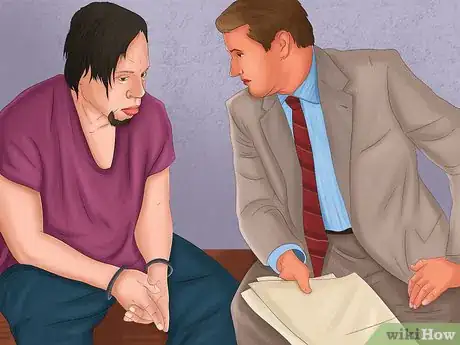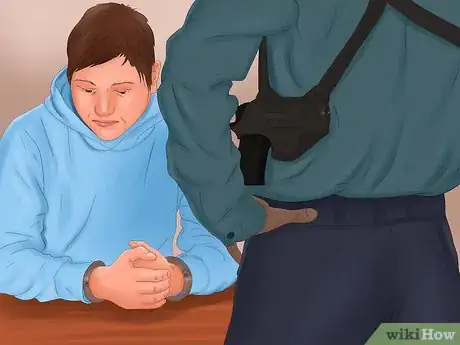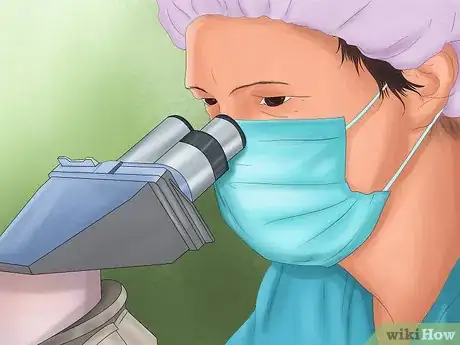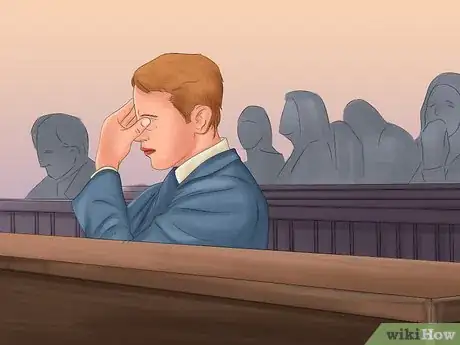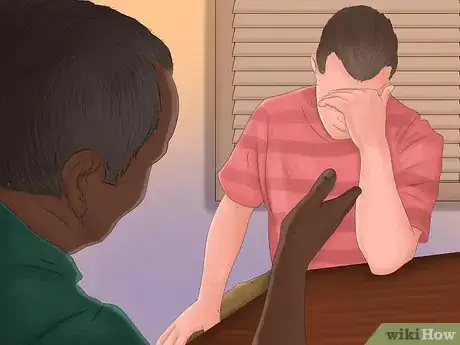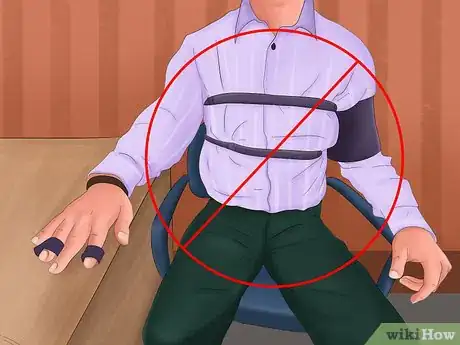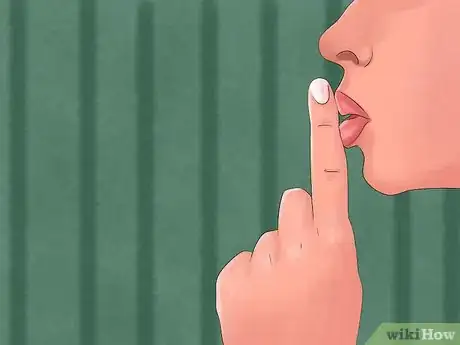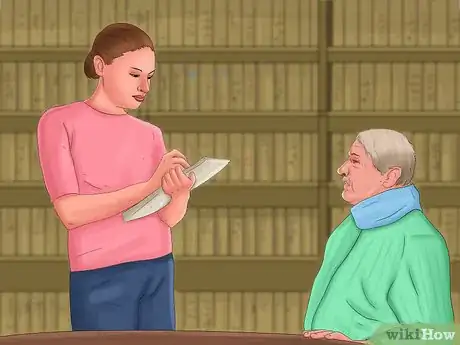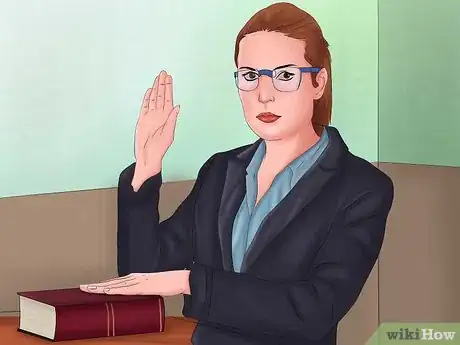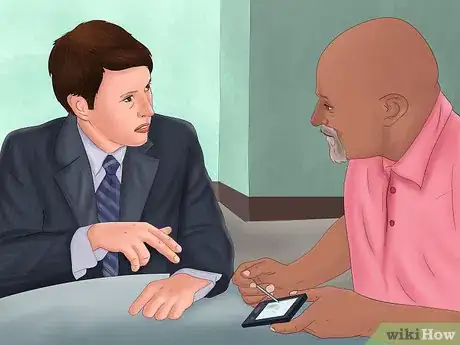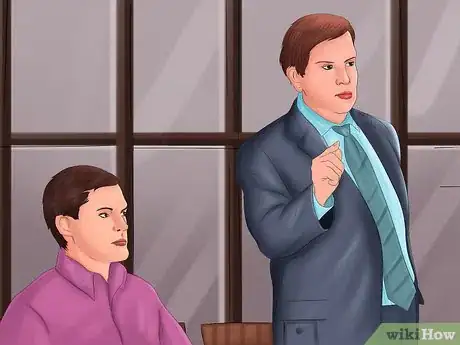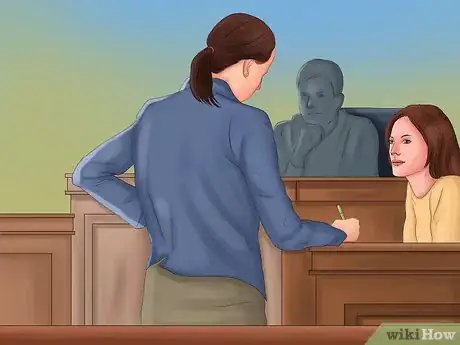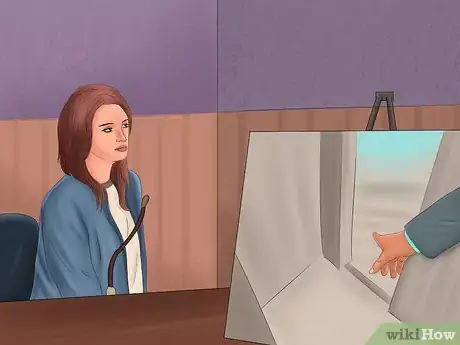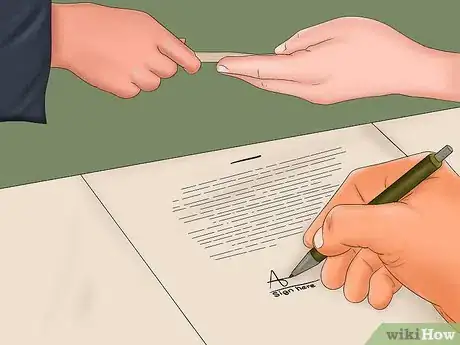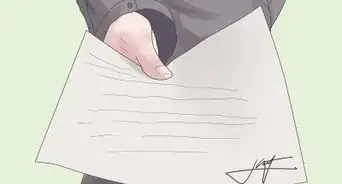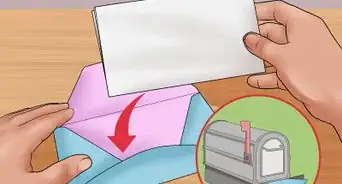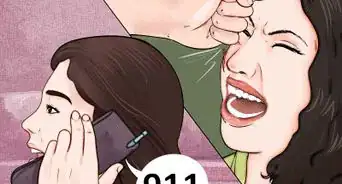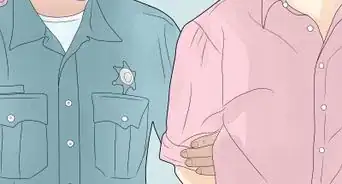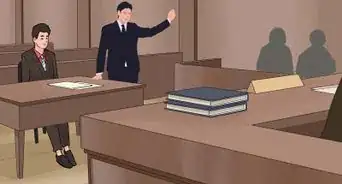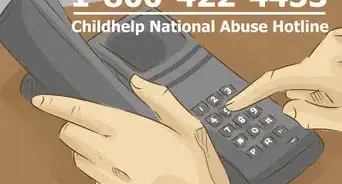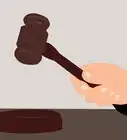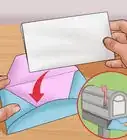This article was co-authored by Clinton M. Sandvick, JD, PhD. Clinton M. Sandvick worked as a civil litigator in California for over 7 years. He received his JD from the University of Wisconsin-Madison in 1998 and his PhD in American History from the University of Oregon in 2013.
There are 11 references cited in this article, which can be found at the bottom of the page.
wikiHow marks an article as reader-approved once it receives enough positive feedback. This article received 11 testimonials and 82% of readers who voted found it helpful, earning it our reader-approved status.
This article has been viewed 404,600 times.
If you were accused of a crime you didn't commit, you should begin formulating your defense immediately. Start by identifying evidence that could bolster your case, and refrain from offering the police anything incriminating. Beating a criminal charge will require perseverance, clear thinking, and effective legal representation, but it's certainly possible.
Steps
Understanding Why People Are Falsely Accused of Crimes
-
1Think about false identifications. False identifications occur when an eyewitness wrongly identifies a person as being the one that committed a crime. Eyewitness testimony can be incredibly persuasive to a judge or jury but DNA has proven time and again that their identifications and testimony are often inaccurate.[1] If you think you have been wrongly identified as a suspect, you should try any of the following:
- Ask for a blind administration of your lineup.[2] This ensures that the officer conducting your lineup does not know who the possible suspect is.[3] It prevents the officer from making suggestive statements to the eyewitness that could lead to that eyewitness wrongly identifying someone as the suspect.
- Request a better lineup composition.[4] When your lineup is conducted, try to make sure all of the other people in the lineup look like the eyewitness's description of the suspect.[5]
- Ask that your identification procedure be recorded.[6] Having your lineup videotaped can be a great way to make sure there is no misconduct.[7] The videotape can act as evidence if you feel something went wrong.
-
2Recognize the possibility of government misconduct. Oftentimes, law enforcement officials and prosecutors have motives that lead them to be dishonest in the execution of their duties. When this happens, they can use their power to convict someone of a crime they didn't commit. If you think this has happened to you, you should try the following:
- Raise the issue at trial. Talk to your attorney or the judge and convey your thoughts. Tell them why you think there has been misconduct and who you think is responsible.
Advertisement -
3Understand false confessions or admissions. A lot of innocent people admit to doing something they didn't in fact do because they believe their cooperation with law enforcement and prosecutors will be better than trying to maintain their innocence.[8]
- If you are being falsely accused of a crime you did not commit, do not fall into this trap and do not admit to anything you didn't do. If you feel threatened by police or attorney questioning at any time, stop talking and request a criminal defense attorney.
-
4Consider improper forensic science. In the present criminal investigatory climate, law enforcement is relying more and more on the use of forensic science, which is the application of science to legal problems.[9] However, a lot of scientific methods being used have not been subjected to sufficient evaluation and this has led to a lot of errors.
- If you think you are being accused of a crime you did not commit because of faulty science, raise this issue at trial and consider hiring a forensics expert.
-
5Know the role of informants. Informants are people that give law enforcement officials information about crimes and misconduct. These informants often have incentives to work with law enforcement, and these incentives can lead to false statements. For example, informants are often past criminals themselves, and they could be lying to law enforcement in order to cover for themselves or for friends.
- If you think an informant has falsely identified you as the suspect, you need to bring this issue up at trial.
-
6Consider inadequate defenses. Sometimes your criminal defense lawyer can inadequately represent you and make mistakes at trial.[10] When a defense attorney incompetently represents a criminal defendant, it can often lead to that defendant being wrongfully convicted.[11]
- If you think your legal defense was inadequate, you will have to appeal your conviction and raise this issue there.
Proving Your Innocence During an Investigation
-
1Stay calm. You probably won’t know that you’ve been accused of a crime until the police show up at the door. Undoubtedly, you will be shocked and confused. Nevertheless, you must remain calm so that you do not make mistakes.
-
2Decline to talk to police. You do not have to talk to police. Even if they arrest you, you may remain silent.
- Police may initially contact you simply as part of their investigation. However, if they begin asking you where you were on a specific date, then you should assume that you are a suspect.
- Police may tell you that it is okay to talk because you are not under arrest. That is meaningless. Anything you say at any time can be used against you in court, whether you have been arrested or not.
- If police take you into custody or formally arrest you, then you should tell them that you want to talk to a lawyer. You must say this explicitly. It is not enough to simply remain silent. If you remain silent, police can continue to lob questions at you in the hopes that you will eventually start talking.[12]
- If you request a lawyer, the police are required to halt all questioning.[13] However, if you re-initiate discussions with the police, then they can interrogate you. For this reason, you should limit your discussions to requests for food or trips to the bathroom. Do not engage in small talk, chit chat, or say anything at all about the charges brought against you. Do not even ask questions about the case.
-
3Hire a lawyer immediately. If you are arrested, then you can request that a public defender be provided. But even if you are not arrested, you should speak to a lawyer once you have found out that you have been accused of a crime.
- A lawyer can help assess your case, e.g., the likelihood that the state has enough evidence to charge you. He might also help you find evidence that supports your innocence.
- You cannot get a public defender until you are arrested, so you will have to pay for the assistance of a lawyer before then.
-
4Put together your alibi. Your attorney should be able to find out the crime you have been accused of, as well as when it happened and where. Then come up with a list of anyone who saw you at the time the crime was committed.
- Your attorney will get sworn written statements from them. Also, your attorney should try to videotape the interview. If the witness disappears before trial, then you may be able to introduce the statements at trial.
- Also look for documentary evidence that you were at a location. ATM receipts or purchases by credit card are a great way of showing that you were not at the crime scene.
- Try to identify if you were at a business that had video surveillance, such as a bank or a convenience store. That evidence can be used to show that you were not at the crime scene.
-
5Identify witnesses to the crime. If you are in prison, then you should hire a private investigator to find who may have witnessed the crime. If you cannot afford a private investigator, then friends or family could investigate.
- Have the investigator go to the location of the crime and ask anyone they see living nearby if they remember the night in question. They may be witnesses themselves.
- The investigator will track down leads. The investigator may also try to talk to your accuser.
- If the government decides to prosecute you, then they will have to release a list of witnesses to you. But they do not necessarily need to do this during the investigation stage.
-
6Save every email and record every phone call in your search for evidence. You may notice a pattern of obstruction. This is useful both in getting that person to stop obstructing you (the ideal scenario) or in proving obstruction in court.
- If the person you are trying to get evidence from has an attorney, you should only work through the attorney.
-
7Present the police with your evidence. After you have consulted with your lawyer, and after you have gathered evidence, then you may want to formally meet with the police and talk with them. Your attorney should be present during the entire interview. This is your chance to present your side of the case.
- Bring the exculpatory evidence with you, including the names and addresses of alibi witnesses.
- The police may choose to arrest you at any point. Be prepared to be arrested.
- If the state has already charged you with a crime, then presenting evidence to them will do little good. They are already confident of their case against you. Nevertheless, all the evidence you have gathered—your alibi evidence, witnesses, etc.—will be useful at trial.
-
8Refuse a polygraph. Some police departments use polygraph exams as part of their investigation.[14] They may tell you that the polygraph exam is a way to clear your name.
- Instead, the polygraph exam is often used as a tool to extract a confession. After you take the exam, you may be told that you failed and that you should confess. You can avoid this scenario by declining to take a polygraph.
Proving Your Innocence at Trial
-
1Be discreet. If you are out of jail awaiting trial, then several opportunities will present themselves to talk to family and friends about the case. You shouldn’t. Anything you say can be admitted against you at trial, even if you don’t testify.
- Often, as a story is repeated, the original story is altered. The media or even the prosecutors could get wind of a wrong version of events.
-
2Avoid the press. If your case is high profile, members of the media may contact you for comments. You really gain nothing by talking to them. Even publicly professing your innocence is unlikely to sway prospective jurors.
- The press can take things out of context. Ultimately, reporters are more interested in ratings and newspaper sales than in helping you prove your innocence. If reporters harass you, refer them to your lawyer.
- Maintain your calm when around the press. Photographers may try to get a reaction just so they can sell a photo of you exploding in rage. They may call you or your family names in order to upset you. Block them out.
-
3Meet with your lawyer. Your lawyer should meet with you at least once before trial begins. She should explain the evidence that the state is presenting against you and her strategy for creating reasonable doubt.
- If you have trial strategies, suggest them to your lawyer. You may have seen something that your lawyer didn’t.
- Even if your lawyer doesn’t meet with you, you can always write letters to your lawyer or call. Stay up to date. No one has more to lose than you.
-
4Decide whether you want to testify. You have a constitutional right not to testify. Nevertheless, it could be helpful. Talk it over with your lawyer. Some factors you should consider include:
- How strong is the prosecution’s evidence? Do they have a witness (other than the victim) who will testify that you committed the crime? Also how credible are their witnesses?
- Do you have strong alibi witnesses? If credible people can place you somewhere other than the crime scene then you may not want to testify.
- Do you have a prior conviction? Evidence of a felony conviction may be used to cast doubt on your credibility. If you decide to testify, the prosecutor can introduce evidence of prior felonies.[15]
- Although you should trust your lawyer’s advice, the ultimate decision whether to testify or not is always up to you.[16]
-
5Stay centered and focused. Most people will decide whether or not you committed the crime based on what they already know of your character, for good or ill. You will find it frustrating that perhaps many might believe you are guilty. However, losing some friends is not as important as losing your liberty or your reputation if convicted.
-
6Prepare for court. You should understand everything that will happen in the trial: who the state will present as witnesses (they will give your lawyer a list), an idea of what the witnesses will say, and the witnesses your lawyer will present.
- Ideally, you should present some form of evidence that rebuts every major piece of evidence offered by the prosecutor. For example, for every witness that the state presents who testifies that he saw you commit the crime, you should have a witness who did not see you commit the crime.
- Also, you should try to impeach the credibility of the prosecution’s witnesses. Come up with theories of why they are lying and gather evidence to support your theory. For example, if someone is biased against you because you took their job, then you should at a minimum raise this issue during the witness’s examination.
-
7Dress professionally. Appearances matter to juries. When you go to court, dress professionally. Choose a clean, pressed, and well-cut outfit to wear. Have a haircut and shave (if relevant).
- Tone down the makeup (if relevant) and don't overdo jewelry or flashy rings.
- If you have facial tattoos, then cover them with makeup. You will be sitting far enough away from the jury so they will not be able to detect that you are wearing makeup.
-
8Be confident. You may be terrified, but you must project an air of calm confidence. Do not smile or make jokes, but nevertheless sit up straight and look at the jury.
- Take notes during the trial. This will give you something to do and also force you to pay attention to the evidence presented. If you have an idea, pass a note along to your lawyer.
-
9Practice being examined. If you plan to testify, you must rehearse constantly. You need to be able to speak clearly and succinctly. Prosecutors encourage their witnesses to tell the truth and speak in their own words.[17] The same advice applies to you.
- Maintain eye contact and speak respectfully.
- Do not exaggerate or do anything that feels unnatural just for an effect. You do not need to cry to make yourself sympathetic.
Proving Your Innocence on Appeal
-
1Understand when you need to appeal. If you have been convicted of a crime you did not commit, you need to appeal your trial conviction soon after it happens. In some states, you are required to file a notice of appeal within ten days of your conviction.
-
2Know what can be appealed. If you are appealing a criminal conviction, the appellate court will only hear legal issues, which means you will not be able to appeal the facts surrounding your case or the decisions of the jury.
- In California, there are only two ways you can appeal a criminal conviction. First, you can appeal and say there was not enough evidence to justify the guilty verdict.[18] Second, you can claim there were mistakes of law that hurt your case (i.e., bad procedures, inadequate assistance of counsel, or wrongful application of a law).[19]
-
3File your written brief. Once you have chosen to appeal and you know that your concern is appealable, you will need to file a written brief with the court that convicted you. Your written brief will contain a description of your claim, the facts supporting your claims, and the legal authority that backs up your claims.
- Take great care when writing your brief and consider hiring an experienced appellate attorney to help you. Your legal brief will be the the most important document during the appellate process so you need to make sure it is well crafted.
-
4Attend a court hearing if necessary. If you said there was not enough evidence to convict you, the appellate court will look at your brief and the trial record and make a decision based solely on those documents.[20] However, if you claimed there was a mistake of law that led to your conviction, the appellate court will hold a hearing and listen to both parties.[21] They will then decide if there is a legitimate reason to overturn your conviction.[22]
Getting a Certificate of Innocence
-
1Obtain and fill out a petition for a certificate of innocence. If you were wrongly convicted of a crime and your conviction has been overturned, you may want to petition a court for a certificate of innocence. A certificate of innocence is a court order conclusively stating that you did not commit the crime for which you were convicted. To start this process, you should either obtain or write a petition to the court asking for a certificate of innocence.
- When you fill out a petition, you will need to tell the court: (1) you were convicted of a crime; (2) your conviction was reversed; and (3) you did not bring about the conviction on your own. The petition should also include any evidence and documentation you have supporting your statements. This will usually include trial orders evidencing your conviction and appellate orders overturning that conviction.
-
2File your petition in the correct court. Once you have written your petition, you will need to file it in the trial court of the county where you were convicted.[23]
-
3Receive a court order granting your petition. Once you have filed your petition, you will be required to go to a court hearing and prove your innocence. If you can do this, the court will likely grant your petition and you will receive a court order conclusively stating your innocence.
References
- ↑ http://www.innocenceproject.org/causes-wrongful-conviction/eyewitness-misidentification
- ↑ http://www.innocenceproject.org/causes-wrongful-conviction/eyewitness-misidentification
- ↑ http://www.innocenceproject.org/causes-wrongful-conviction/eyewitness-misidentification
- ↑ http://www.innocenceproject.org/causes-wrongful-conviction/eyewitness-misidentification
- ↑ http://www.innocenceproject.org/causes-wrongful-conviction/eyewitness-misidentification
- ↑ http://www.innocenceproject.org/causes-wrongful-conviction/eyewitness-misidentification
- ↑ http://www.innocenceproject.org/causes-wrongful-conviction/eyewitness-misidentification
- ↑ http://www.innocenceproject.org/causes-wrongful-conviction/false-confessions-or-admissions
- ↑ http://legal-dictionary.thefreedictionary.com/Forensic+Science
- ↑ http://www.innocenceproject.org/causes-wrongful-conviction/inadequate-defense
- ↑ http://www.innocenceproject.org/causes-wrongful-conviction/inadequate-defense
- ↑ http://www.nbcnews.com/id/37448356/ns/us_news-crime_and_courts/t/right-remain-silent-suspect-better-speak/#.VVtrP7lFDIU
- ↑ https://supreme.justia.com/cases/federal/us/498/146/case.html
- ↑ http://articles.chicagotribune.com/2013-11-29/news/ct-chicago-police-polygraph-unit-met-20131129_1_polygraphs-examiners-chicago-police-department
- ↑ http://www.nolo.com/legal-encyclopedia/evidence-prior-convictions-admissible-against-defendants-who-testify.html
- ↑ http://www.nolo.com/legal-encyclopedia/evidence-prior-convictions-admissible-against-defendants-who-testify.html
- ↑ http://www.justice.gov/usao-mdpa/victim-witness-assistance/tips-testifying-court
- ↑ http://www.courts.ca.gov/1069.htm
- ↑ http://www.courts.ca.gov/1069.htm
- ↑ http://www.courts.ca.gov/1069.htm
- ↑ http://www.courts.ca.gov/1069.htm
- ↑ http://www.courts.ca.gov/1069.htm
- ↑ http://www.ilga.gov/legislation/ilcs/fulltext.asp?DocName=073500050K2-702
About This Article
To prove you’re innocent of a crime, hire a lawyer as soon as possible, so they can support you through the process. Although you might be eager to clear your name, avoid talking to the police until you meet with your lawyer, since they might try to extract a false confession out of you. Working with your lawyer, trace your movements to find an alibi, like an eye witness, store receipts from the time of the crime, or video surveillance proving your location. When you’ve found evidence of your innocence, present it to the police with your lawyer if you’re still under investigation. If it goes to court, you’ll need to present evidence to a judge and jury. This can be scary, but remember that you’re innocent and stay calm, since the truth will come out. For more tips from our Legal co-author, including how to prove your innocence during an appeal, read on.

